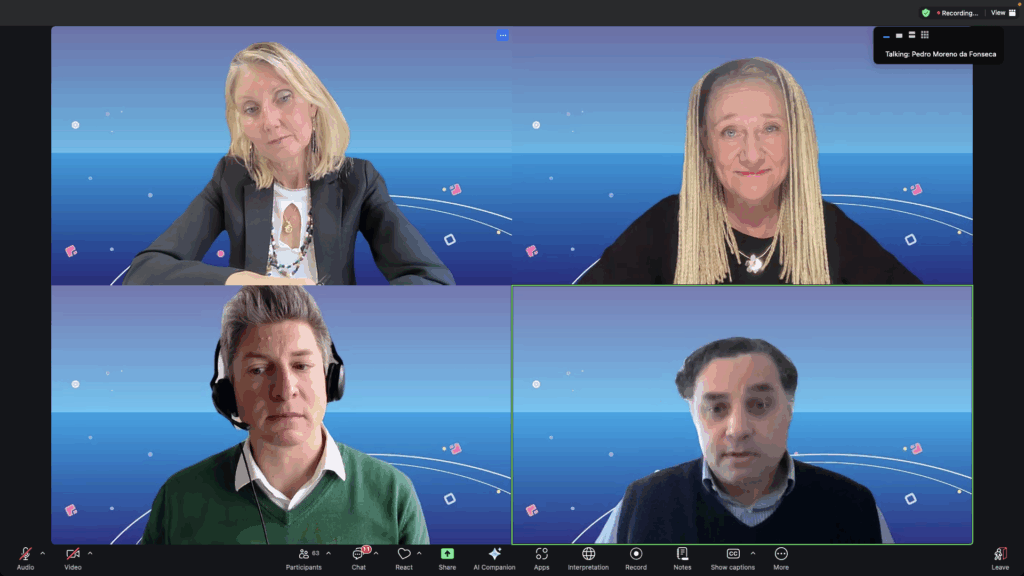EARLALL Takes Part in the Closing of the 2025 Global Careers Month
27/11/2025

On 26 November 2025, EARLALL joined global partners, policymakers, and practitioners for the Closing Ceremony of the Second Global Careers Month, hosted by OECD, ILO, UNESCO, ETF, and Cedefop. The event gathered regional voices and international experts to reflect on the achievements of the past month and map out future ambitions for strengthening career guidance systems worldwide.
Chaired by Glenda Quentini (OECD), the session highlighted both progress and persistent challenges in ensuring that learners of all ages can access high-quality career guidance throughout their lives—an agenda strongly aligned with EARLALL’s mission.
Reflections from the First Panel: Improving Global Career Guidance Systems
Reaching those beyond formal systems
Jaana Kettunen (IAEVG President) opened the reflections by emphasising the critical need to reach individuals outside formal education and training systems. Many adults, jobseekers, and vulnerable groups are unaware of available services or struggle to access them.
She highlighted four key challenges:
- Reaching those beyond formal systems who often lack structured support.
- Fragmentation and lack of harmonised systems, leading to inconsistent service quality.
- Capacity gaps, particularly in training and professional development for counsellors.
- The need for approaches grounded in local realities, as one-size-fits-all models rarely work.
Career guidance as an investment, not a cost
Florian Kadletz (ETF) echoed concerns around fragmentation, noting that many countries continue to face obstacles in building coherent, systemic career guidance frameworks. He stressed:
- Persistent coordination challenges between institutions.
- The dominant reliance on public funding, which often lacks sustainability.
- Weak or non-existent quality assurance mechanisms.
- The need to integrate guidance from school onwards, ensuring continuity throughout the lifespan.
Kadletz insisted on shifting the narrative: career guidance must be recognised as an investment in people and labour-market resilience, not merely an administrative cost. He also underlined access gaps, as public employment services (PES) tend to focus on the unemployed, leaving many others underserved. NGOs and social partners, he added, remain underutilised despite their potential.
Embedding career guidance in wider policy strategies
Pedro Moreno da Fonseca (ILO) aligned with previous speakers, highlighting clear evidence of career guidance impact—yet stressed that few adults and workers actually use or know about these services. While many countries have created digital platforms, “availability does not equal use,” and engagement remains limited.
He encouraged policymakers to:
- Embed career guidance into social protection and employment policies.
- Leverage employers, sector organisations, and trade unions as direct support channels for workers.
- Improve infrastructure, information quality, and accessibility to ensure real uptake.
Second Panel: Innovative Solutions from Around the World
Moderated by Ramon Iriarte (UNESCO) and Cynthia Harrison-Villalba (Cedefop), the second panel gathered voices from multiple global regions, showcasing promising practices and innovative approaches.
Canada: strengthening competencies and professionalism
Canadian representatives highlighted a comprehensive framework for career development quality and standards, referencing:
- The Canadian Career Development Framework (cedc.ca)
- National credentialing efforts (ncdacredentialing.org)
- The recent publication “Beyond Decent Work Playbook”, offering strategies for more holistic, sustainable career support models.
Their approach underscored the importance of professionalisation, competency frameworks, and shared standards to strengthen the field.
Chile: personalised counselling and active employment approaches
Natalia Orellana explained that Chile lacks a unified national policy for career guidance, yet several effective initiatives exist—particularly in the context of employment incentives and upskilling. She highlighted personalised counselling services, especially targeted at people over 50, which have shown promising outcomes and demonstrate the value of targeted support for specific demographic groups.
Closing: Beyond 2025 — Continuing the Momentum
The final segment, Goodbye to Global Careers Month 2025 & Follow-Up, reiterated a shared commitment: career guidance must be accessible, high-quality, lifelong, and embedded in broader policies that support economic transitions and individual empowerment.
EARLALL’s participation in the Closing Ceremony reflects its ongoing engagement in building strong regional ecosystems for lifelong guidance. The EARLALL Working Group on Lifelong Guidance actively promotes:
- Regional cooperation on guidance policies
- The importance of connecting education, VET, employment, and social sectors
- Approaches that respond to local contexts and labour-market realities, in line with messages from Global Careers Month speakers
The event also connected strongly with EARLALL’s involvement in the EU-funded project Guidance 5.0, which aims to modernise and innovate guidance systems through digitalisation, inclusiveness, and closer alignment with skills transitions across Europe.

